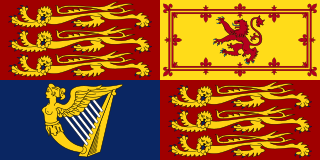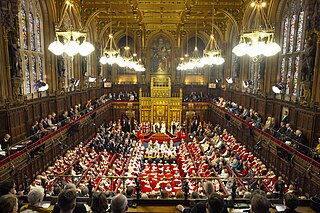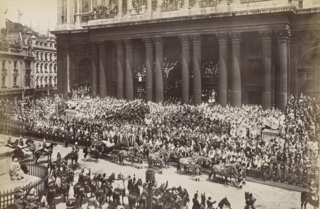
The monarchy of the United Kingdom, commonly referred to as the British monarchy, is the constitutional form of government by which a hereditary sovereign reigns as the head of state of the United Kingdom, the Crown Dependencies and the British Overseas Territories. The current monarch is King Charles III, who ascended the throne on 8 September 2022, upon the death of his mother, Queen Elizabeth II.

A speech from the throne, or throne speech, is an event in certain monarchies in which the reigning sovereign, or their representative, reads a prepared speech to members of the nation's legislature when a session is opened. The address sets forth the government's priorities for its legislative agenda, for which the cooperation of the legislature is sought. The speech is often accompanied by formal ceremony. It is often held annually, although in some places it may occur more or less frequently, whenever a new session of the legislature is opened.
A golden jubilee marks a 50th anniversary. It variously is applied to people, events, and nations.

The royal standards of the United Kingdom presently refer to either of two similar flags used by King Charles III in his capacity as sovereign of the United Kingdom, the Crown dependencies, and the British Overseas Territories. Two versions of the flag exist, one for use within Scotland and the other for use elsewhere.
The style and title of the Canadian sovereign is the formal mode of address of the monarch of Canada. The form is based on those that were inherited from the United Kingdom and France, used in the colonies to refer to the reigning monarch in Europe. As various Canadian territories changed ownership and then the country gradually gained independence, the style and title of the monarchs changed almost as often as the kings and queens themselves. The mode of address currently employed is a combination of a style that originates in the early 17th century and a title established by Canadian law in 2024.

The State Opening of Parliament is a ceremonial event which formally marks the beginning of each session of the Parliament of the United Kingdom. At its core is His Majesty's "gracious speech from the throne", which is read by the monarch but written by HM Government. In the speech the monarch gives notice of forthcoming state visits, before setting out the government's legislative programme for the new parliamentary session. No business of either House of Parliament can proceed until the Sovereign’s speech has been delivered.

In the United Kingdom, the Accession Council is a ceremonial body which assembles in St James's Palace in London upon the death of a monarch to make formal proclamation of the accession of the successor to the throne. Under the terms of the Act of Settlement 1701, a new monarch succeeds automatically. The proclamation confirms by name the identity of the new monarch, expresses loyalty to the "lawful and rightful Liege Lord", and formally announces the new monarch's regnal name, while the monarch and others, in front of the council, sign and seal several documents concerning the accession. An Accession Council has confirmed every English monarch since James I in 1603.

The King's Privy Council for Canada, sometimes called His Majesty's Privy Council for Canada or simply the Privy Council (PC), is the full group of personal consultants to the monarch of Canada on state and constitutional affairs. Practically, the tenets of responsible government require the sovereign or his viceroy, the governor general of Canada, to almost always follow only that advice tendered by the Cabinet: a committee within the Privy Council composed usually of elected members of Parliament. Those summoned to the KPC are appointed for life by the governor general on the advice of the prime minister of Canada, meaning that the group is composed predominantly of former Cabinet ministers, with some others having been inducted as an honorary gesture. Those in the council are accorded the use of an honorific style and post-nominal letters, as well as various signifiers of precedence.

The King's Official Birthday is the selected day in most Commonwealth realms on which the birthday of the monarch is officially celebrated in those countries. It does not necessarily correspond to the date of the monarch's actual birth.

A throne room or throne hall is the room, often rather a hall, in the official residence of the crown, either a palace or a fortified castle, where the throne of a senior figure is set up with elaborate pomp—usually raised, often with steps, and under a canopy, both of which are part of the original notion of the Greek word thronos.

The monarchy of Australia is a key component of Australia's form of government, embodied by the Australian sovereign and head of state. The Australian monarchy is a constitutional one, modelled on the Westminster system of parliamentary government, while incorporating features unique to the constitution of Australia.

Canadian royal symbols are the visual and auditory identifiers of the Canadian monarchy, including the viceroys, in the country's federal and provincial jurisdictions. These may specifically distinguish organizations that derive their authority from the Crown, establishments with royal associations, or merely be ways of expressing loyal or patriotic sentiment.

The history of monarchy in Canada stretches from pre-colonial times through to the present day. The date monarchy was established in Canada varies; some sources say it was when the French colony of New France was founded in the name of King Francis I in 1534, while others state it was in 1497, when John Cabot made landfall in what is thought to be modern day Newfoundland or Nova Scotia, making a claim in the name of King Henry VII. Europeans in the 16th and 17th centuries often considered the territories belonging to different aboriginal groups to be kingdoms. Nevertheless, the present Canadian monarchy can trace itself back to the Anglo-Saxon period and ultimately to the kings of the Angles and the early Scottish kings; monarchs reigning over Canada have included those of France, those of the United Kingdom, and those of Canada. Canadian historian Father Jacques Monet said of Canada's Crown, "[it is] one of an approximate half-dozen that have survived through uninterrupted inheritance from beginnings that are older than our Canadian institution itself."

The monarchy of Jamaica is a system of government in which a hereditary monarch is the sovereign and head of state of Jamaica. The current Jamaican monarch and head of state, since 8 September 2022, is King Charles III. As sovereign, he is the personal embodiment of the Jamaican Crown. Although the person of the sovereign is equally shared with 14 other independent countries within the Commonwealth of Nations, each country's monarchy is separate and legally distinct. As a result, the current monarch is officially titled King of Jamaica and, in this capacity, he and other members of the royal family undertake public and private functions domestically and abroad as representatives of the Jamaican state. However, the monarch is the only member of the royal family with any constitutional role.

The monarchy of The Bahamas is a system of government in which a hereditary monarch is the sovereign and head of state of the Commonwealth of The Bahamas. The current Bahamian monarch and head of state since 8 September 2022, is King Charles III. As sovereign, he is the personal embodiment of the Bahamian Crown. Although the person of the sovereign is equally shared with 14 other independent countries within the Commonwealth of Nations, each country's monarchy is separate and legally distinct. As a result, the current monarch is officially titled King of The Bahamas and, in this capacity, he and other members of the royal family undertake public and private functions domestically and abroad as representatives of the Bahamian state. However, the King is the only member of the Royal Family with any constitutional role.

The monarchy of Papua New Guinea is a system of government in which a hereditary monarch is the sovereign and head of state of Papua New Guinea. The current Papua New Guinean monarch and head of state, since 8 September 2022, is King Charles III. As sovereign, he is the personal embodiment of the Papua New Guinean Crown. Although the person of the sovereign is equally shared with 14 other independent countries within the Commonwealth of Nations, each country's monarchy is separate and legally distinct. As a result, the current monarch is officially titled King of Papua New Guinea and, in this capacity, he and other members of the royal family undertake public and private functions domestically and abroad as representatives of Papua New Guinea. However, the King is the only member of the royal family with any constitutional role.

The Diamond Jubilee of Queen Victoria was officially celebrated on 22 June 1897 to mark the occasion of the 60th anniversary of Queen Victoria's accession on 20 June 1837. Queen Victoria was the first British monarch ever to celebrate a Diamond Jubilee.

The Sapphire Jubilee of Elizabeth II on 6 February 2017, marked 65 years of Queen Elizabeth II's reign. The longest-reigning monarch in British history, Elizabeth II was the first British monarch to have a sapphire jubilee.

The Ruby Jubilee of Elizabeth II in 1992 marked the 40th anniversary of the accession of Queen Elizabeth II on 6 February 1952. Contrary to her Silver Jubilee in 1977, it was not regarded as an "official" jubilee. However, the milestone was marked with a number of events and community projects.
Charles III became King of the United Kingdom and of 14 other Commonwealth realms upon the death of his mother, Elizabeth II, on 8 September 2022. Royal succession in the realms occurs immediately upon the death of the reigning monarch. The formal proclamation in Britain occurred on 10 September 2022, at 10:00 BST, the same day on which the Accession Council gathered at St James's Palace in London. The other realms, including most Canadian provinces and all Australian states, issued their own proclamations at times relative to their time zones, following meetings of the relevant privy or executive councils. While the line of succession is identical in all the Commonwealth realms, the royal title as proclaimed is not the same in all of them.
















